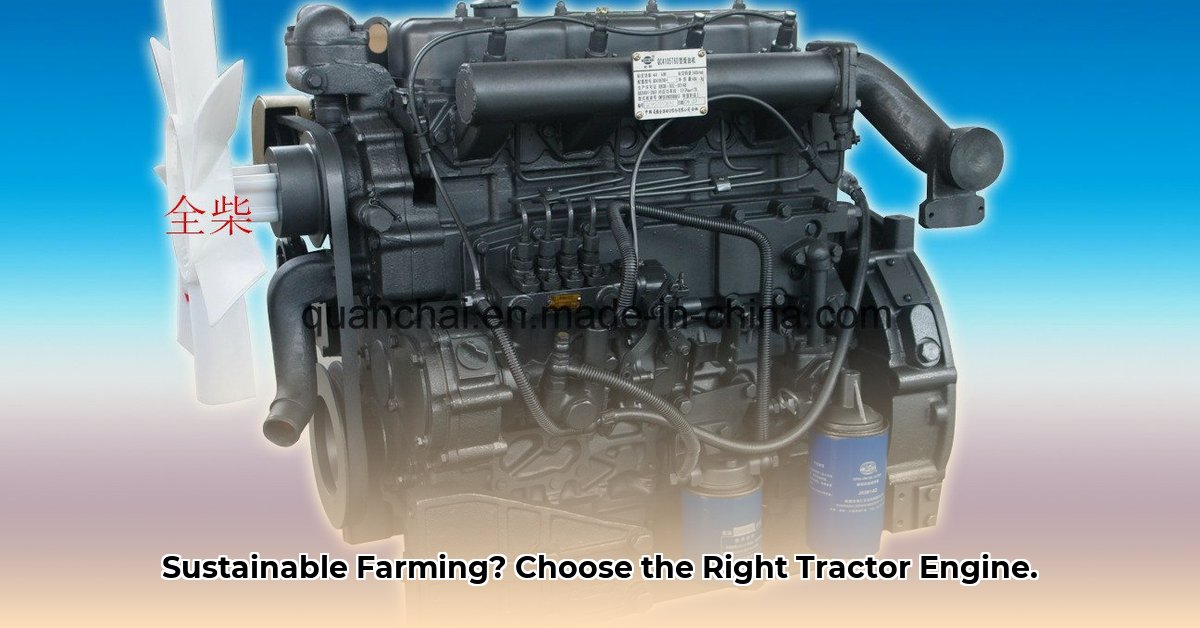
Engine Types for Sustainable Agriculture: A Comparative Analysis
Choosing the right tractor engine is a critical decision for modern farmers, impacting profitability, environmental responsibility, and long-term sustainability. This guide compares the leading engine types – diesel, compressed natural gas (CNG), propane, electric, and hybrid – to help you make an informed choice tailored to your farm's specific needs. We'll analyze performance, environmental impact, economic viability, infrastructure requirements, and technical aspects. For more information on engine oil, see this helpful resource.
Performance: Power and Efficiency in the Field
Diesel engines have long dominated agriculture due to their robust power and torque, ideal for large-scale operations. However, alternative fuels and electric power are rapidly changing this landscape. CNG and propane engines offer competitive fuel efficiency, particularly for smaller farms, while electric tractors stand out with silent operation and zero tailpipe emissions. Hybrid systems combine the strengths of different power sources, potentially optimizing fuel efficiency and reducing running costs.
- Diesel: High power and torque; established infrastructure; readily available fuel. However, lower fuel economy and higher emissions compared to alternatives.
- CNG: Good fuel efficiency and lower greenhouse gas emissions than diesel. But, limited infrastructure and fluctuating fuel prices are drawbacks.
- Propane: Similar emissions and fuel efficiency to CNG, with potentially easier and safer on-farm storage. However, infrastructure is still developing.
- Electric: Environmentally friendly; silent operation; zero tailpipe emissions; generally lower running costs. But, high initial investment and limited battery technology/charging infrastructure.
- Hybrid: Combines advantages of different power sources for optimized fuel efficiency and lower running costs. However, complex systems with high upfront costs and potentially complex maintenance.
Important Question: Considering the long-term operational costs, which engine type offers the best return on investment for your farm size and workload?
Environmental Impact: Minimizing Your Footprint
Minimizing environmental impact is increasingly important. Electric tractors lead the way with zero tailpipe emissions. CNG and propane engines offer substantial emission reductions compared to diesel. However, the entire lifecycle—from fuel production and engine manufacturing to disposal—must be considered.
Quantifiable Fact: CNG and propane engines can reduce greenhouse gas emissions by 50-70% compared to diesel.
Economic Viability: Balancing Costs and Returns
Initial costs vary significantly between engine types. Electric and hybrid tractors are considerably more expensive up-front, while CNG and propane tractors fall between diesel and electric in terms of initial purchase price. However, long-term considerations—fuel costs, maintenance, and potential government incentives—are crucial. Diesel’s low initial cost is often offset by its higher fuel consumption and maintenance. A thorough, lifecycle return on investment (ROI) analysis is essential.
Infrastructure Requirements: Fuel and Support
Fuel availability and infrastructure are critical. Diesel fuel is widespread, but CNG and propane require specialized facilities. Electric tractors necessitate reliable charging infrastructure, still developing particularly in rural areas. Technician availability and expertise for maintenance and repair should be considered for each engine type.
Technical Aspects: Examining the Engine's Inner Workings
Each engine type has unique technical features. Diesel engines are durable but heavy and less fuel-efficient. CNG and propane engines have complex pressure regulations systems. Electric motors are mechanically simpler but rely on sophisticated battery technology. The availability of skilled technicians for maintenance and repair also influences the choice.
Risk Assessment Matrix: Weighing the Variables
This matrix summarizes the relative risks for each engine type. Actual risk profiles vary depending on specific models and operating conditions.
| Engine Type | Initial Investment Risk | Reliability Risk | Maintenance Risk | Fuel Availability Risk | Environmental Impact Risk | Regulatory Compliance Risk |
|---|---|---|---|---|---|---|
| Diesel | Low | Low | Moderate | Low | High | Moderate |
| CNG | Moderate | Moderate | Moderate | High | Low | High |
| Propane | Moderate | Moderate | Moderate | High | Low | High |
| Electric | High | Moderate | Low | High | Very Low | High |
| Hybrid | High | Low | High | Moderate | Moderate | High |
Regulatory Implications: Future-Proofing Your Investment
Emission regulations are continually tightening, favoring cleaner engines. This trend could significantly impact the long-term viability of diesel tractors, while benefiting electric, CNG, and propane options. Staying informed about evolving regulations is crucial.
Actionable Recommendations: Choosing the Right Engine for Your Farm
The optimal engine depends on your farm's specific needs and circumstances.
Assess Farm Size and Operations: Large-scale operations may benefit from the power of diesel or the long-term cost savings of hybrids but need to ensure charging infrastructure. Smaller farms might find propane or electric tractors more cost-effective and suitable.
Analyze ROI: Conduct a detailed cost-benefit analysis, including initial investment, fuel costs, maintenance, potential government incentives, and long-term operational costs.
Evaluate Infrastructure: Ensure adequate fuel supply and maintenance support for your chosen engine type.
Consider Environmental Goals: Prioritize reduced emissions if environmental sustainability is a key goal.
Consult with Experts: Seek advice from agricultural experts and equipment dealers to tailor your decision to your unique circumstances.
Expert Quote: "The transition to sustainable agriculture requires careful consideration of all aspects of tractor technology. A holistic cost-benefit analysis, factoring in environmental impact and regulatory compliance, is essential," explains Dr. Amelia Hernandez, Agricultural Engineering Professor at the University of California, Davis.
Conclusion: Sustainable Farming Requires Smart Engine Choices
Choosing a tractor engine requires careful consideration of diverse factors—performance, economic viability, environmental impact, and regulatory compliance. This guide provides a framework for making an informed decision, ensuring your tractor engine supports sustainable and profitable agriculture for years to come. Staying informed about technological advancements and evolving regulations is an ongoing process for informed and responsible farming.